
September 18

1907 Birth: Leon Askin, Austrian actor:
I was known among my colleges and to my producers as an accent actor and I was condemned, if one could say so, to wait for roles where a Russian, French, Arabian, Rumanian or Chinese accent is expected, but no American. I never became a superstar, yet in the TV series 'Hogan's Heroes' I played the starring part of General Burghalter.
[See: Hogan's Jews: 5 Cast Members Were Jews; Their Stories.]1911 Death: Russian Premier Piotr Stolypin: four days after being shot at the Kiev opera house by socialist lawyer Dimitri Bogroff.
1914 World War I: Various:
The Battle of Aisne ends in a French defeat.
List Regiment (Sep 1-Oct 7):
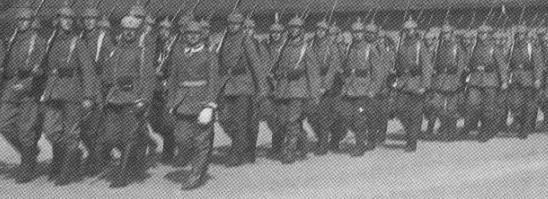
Infantry Recruit Adolf Hitler's regiment continues a short but intensive basic training program, which is held in the premises of a large public school on the Elizabeth Platz in Munich. Hitler receives the first uniform of his life; basic greenish-grey with an "RIR 16" sown in red unto the epaulettes and a red stripe down the side of the trousers. The trousers are tucked into new leather boots, topped by a thick leather belt around the waist of the uniform jacket. [For further details, Click here.]
South African troops land in German South West Africa.
The Irish Home Rule Bill becomes law, but its implementation is delayed until after the war.
1915 World War I: Various:

List Regiment: Gefreiter Adolf Hitler's 16 Reserve Infantry Regiment continues to occupy a position at Fromelles—pictured above in a drawing by Hitler—on a level field with water channels, willow trees and willow stalks. In the distance towards the enemy lines lies an insignificant wood with barbed wire entanglements. Under the direction of their defense-minded commander, Lieutenant General Gustav Scanzoni von Lichtenfels, the regiment works ceaselessly day and night to further fortify their position at Fromelles while fighting off repeated assaults by the enemy. [For further details, Click here.]
The German occupation of Vilna climaxes a colossal 300 mile advance. Russian Grand Duke Nikolai skillfully keeps his armies intact, withdrawing in fairly good order, while evading German envelopment.By the end of September, German General Hindenburg has reach[ed] the outskirts of Riga in Latvia, and in the Battle of Vilna (or Vilnius), captures Vilna on the border with Lithuania. Subsequent German thrusts towards Riga and Dvinsk, both on the Dvina River are repulsed.
1916 World War I:
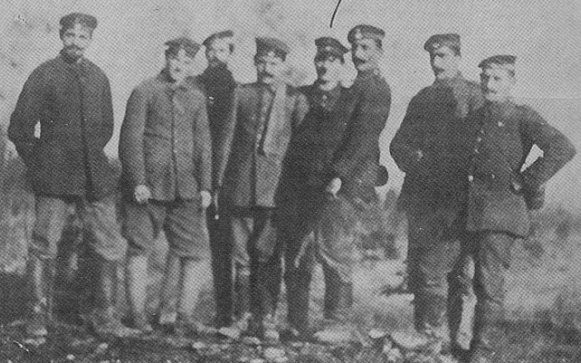
Hitler and his fellow dispatch runners
Gefreiter Adolf Hitler endures trench warfare in Flanders (Artois) with 3 Company, 16 Reserve Infantry Regiment [List Regiment]. [For further details, Click here.]
1917 World War I (September 11-30):
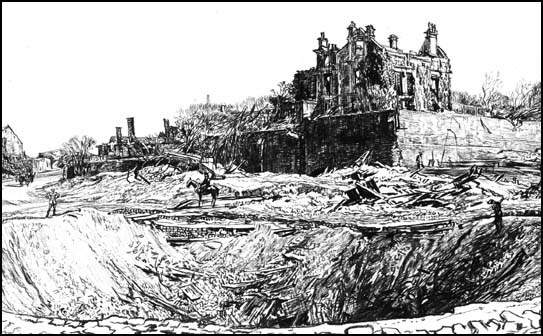
The List Regiment remains on light duty, guarding a camp near Mulhouse in Alsace, the only section of the front on German soil. During this slow time, not only will Hitler and his comrades get a well-deserved respite from the rigors of trench warfare, but the heavily censored news from the Front seems to be improving as well. The news of the collapse of the Russian Front and the further defeats of Italian arms is, however, tempered by the news that German munitions workers have gone on strike. This mix of events give an impression that the war on the Front is going well, but being undermined by defeatism on the home front. [For further details, Click here.]
1918 World War I: Various:

Battle of Megiddo:
The long and at times obstinate conflicts in the valley of the Jordan gave Allenby time to complete the railway connections between Cairo and Jerusalem. In order to have a word to say regarding the prospective conquest of Syria, France sent a fresh division to cooperate with Allenby's forces. On September 18th, 1918, the great English-French attack on the Turkish lines between the Jordan and the sea began. It was flanked on the west by the artillery fire of the numerous warships, and to the east of the Hejaz Railroad by the rebellious Arab tribes under their new King Hussein. The powerful and well-directed offensive, with its preponderance of numbers particularly as to cavalry, which was here of great service, met with complete success.
Battle of Epehy: Named by the British for the German commander in chief, Paul von Hindenburg—the Germans referred to it as the Siegfried Line—the Hindenburg Line was a semi-permanent line of defenses that Hindenburg ordered created several miles behind the German front lines in late 1916. The following spring, the German army made a well-planned withdrawal to this heavily fortified defensive zone, burning and looting villages and countryside as they passed, in order to buy themselves time and confuse the Allied plans of attack. By early September 1918, Allied forces had effectively countered the major German spring offensive of that year and had reached the furthest forward positions of the Hindenburg Line, considered by many on both sides to be impregnable. [For further details, Click here]
Battle of Dobro Pole: The Central Powers' defeat played a role in the Bulgarian withdrawal from the war and opened the way for the subsequent liberation of Vardar Macedonia. [For further information, click here.]
List Regiment: (August 21-September 27):
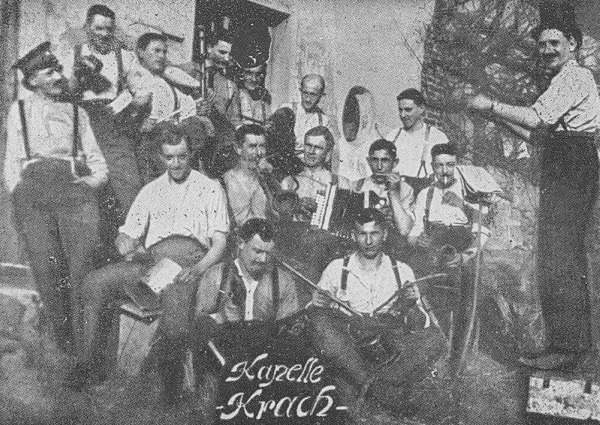
Gefreiter Adolf Hitler attends a signals training course in Nuremberg. [For further details, Click here.]
1919 Statement by Paderewski on the League of Nations:
From a Polish point of view, our one hope of future security as a State lies in the League of Nations. Upon it, and I fear upon it alone, depend the liberty of the Polish people and the successful development of democratic and liberal government in Poland. Standing, as we are, between Germany on one side and Russia on the other, we cannot hope to maintain our integrity during these years, while we build up the strength of our people, unless we have the protection of the League. Poland at the present moment has 500,000 men under arms. Our people are short of food supplies, short of clothing, short of many of the necessaries of life. We are compelled to make every sacrifice to sustain the army, and this, with our population needing its resources for the up-building of the nation, in order that we may protect ourselves from encroachment. Today we are defending 1,500 miles of front against Bolshevist forces, and in so doing, we stand as the front line in Europe against Bolshevist invasion from the east.
1931 Death: Geli Raubal: German politician Adolf Hitler's niece and reputed love interest, commits suicide in Hitler's Munich apartment.
[See: Was Adolf Hitler 'Normal' Sexually?]Mukden Incident: Japanese soldiers stationed in southern Manchuria are involved in a minor clash with Chinese troops. Japan uses the incident as an excuse to spread its forces throughout Manchuria, subduing the region.
[See: Countdown to Infamy: Pearl Harbor.]1933 The Nazi-dominated Danzig Senate guarantees basic rights to Poles living in the Free City.
1934 The Soviet Union is admitted to League of Nations and is given a permanent seat on the Council.
1936 David Lloyd George publicly expresses enthusiasm for Hitler and his regime after visiting the Fuehrer in Germany.
1938 Sudeten Crises: British and French cabinet members, meeting in London, finalize an Anglo-French plan to 'appease' Hitler in regard to Czechoslovakia.
1939 World War II: Various:
U-29 sinks the British aircraft carrier Courageous, killing 500:
Had the Allies known that the Germans were having torpedo problems, they would have been grateful for that small favor. The Germans scored early successes that forced the British to adopt exactly the wrong tactics to fight the U-boats. In September 1939, U-29 sank HMS Courageous, and torpedoes that hit HMS Ark Royal broke up on impact. The Admiralty under Winston Churchill pulled the carriers from antisubmarine patrol and put the merchantmen into convoys. While this allowed mutual assistance among the convoy ships, it also allowed the Germans to focus multiple U-boats on the convoy and vector in subsequent attacks by radio.
German Ambassador in the USSR (Schulenburg) to German Foreign Office:
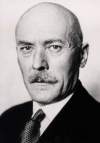
In the course of the conversation which I had this evening with Stalin about the dispatch of a Soviet commission to Bialystok, as well as the publication of a joint communiqué, Stalin said, somewhat suddenly, that on the Soviet side there were certain doubts as to whether the German High Command at the appropriate time would stand by the Moscow agreement and would withdraw to the line that had been agreed upon (Pissa-Narew-Vistula-San). I replied with emphasis that of course Germany was firmly determined to fulfill the terms of the Moscow agreements precisely, and I referred to point 2 of the communication made by me to Molotov on September 16 in accordance with the instructions of the Reich Foreign Minister (see telegram No. 360 of September 15 from there). I declared that it would be suitable for the High Command to withdraw to the line which had been agreed upon since, in this way, troops could be made available for the western front. Stalin replied that he had no doubt at all of the good faith of the German Government. His concern was based on the well-known fact that all military men are loath to give up occupied territories. At this point the German Military Attaché here, Lieutenant General Koestring, interjected that the German armed forces would do just as the Fuehrer ordered. In view of Stalin's well-known attitude of mistrust, I would be gratified if I were authorized to make a further declaration of such a nature as to remove his last doubts.
Memorandum by Counselor of Legation Hilger of the German Embassy in the Soviet Union:
On September 17 at 3 PM, the draft of a joint German-Soviet communiqué was transmitted by telephone with instructions to obtain the consent of the Soviet Government to the publication of such a communiqué on September 18. The text of this draft is enclosed. On September 17 at 11:30 p. m., the Ambassador submitted the draft to Herr Molotov for approval. The latter stated that he would have to consult with Herr Stalin on the matter. Herr Stalin, who was called on the telephone by Herr Molotov, declared that in his opinion, too, a joint communiqué had to be issued, but that he could not entirely agree to the text proposed by us since it presented the facts all too frankly [da es den Tatbestand mit allzu grosser Offenheit darlege]. Thereupon Herr Stalin wrote out a new draft in his own hand and asked that the consent of the German Government be obtained to this new draft. (below) On September 18 at 12:30 a. m., I communicated to Under State Secretary Gaus the text of the Soviet draft. Herr Gaus stated that he could not of his own accord declare himself on the matter and had to ascertain the decision of the Reich Foreign Minister. On September 18 at 12 o'clock noon, the Chief of the Office of the Minister, Herr Kordt, called up on the telephone and informed me as follows: "We agree to Russian proposal concerning communiqué and shall publish the communiqué in this form Tuesday in the morning papers. Ribbentrop." I immediately transmitted the above communication by telephone to Herr Molotov's secretary. On September 18 at 2:05 p. m., Herr Kordt called up again and informed Counselor of Embassy von Tippelskirch as follows: "The communiquéwill be published by us in some of the evening papers. Please advise the offices concerned." I immediately apprised Herr Molotov's secretary of the above-mentioned communication also. Two hours later the text of the communiqué appeared on the teletype and was also broadcast over the German short-wave radio. On September 18 at 7:15 p. m., Herr Gaus called up and asked whether the communiqué would be published today in the Russian evening papers. If not, it should be broadcast today over the Soviet radio. The Reich Foreign Minister was very anxious that this be done. I told Herr Gaus that today, because it was the Russian Sunday, no evening papers had appeared; that I would inform them further regarding the radio. At 8.00 p.m. I was able to let Herr Gaus know that the Soviet radio had broadcast the communiqué several times since 4:00 PM.
Draft of a Joint German-Soviet Communiqué:
In view of the internal incapacity of the Polish State and of the dissension of the populations living in its former territory, the Reich Government and the Government of the USSR consider it necessary to bring to an end the intolerable political and economic conditions existing in these territories. They regard it as their joint duty to restore peace and order in these areas which are naturally of interest to them and to bring about a new order by the creation of natural frontiers and viable economic organizations.
In order to avoid all kinds of unfounded rumors concerning the respective aims of the German and Soviet forces which are operating in Poland, the Government of the German Reich and the Government of the USSR declare that the operations of these forces do not involve any aims which are contrary to the interests of Germany and of the Soviet Union, or to the spirit or the letter of the Non-aggression Pact concluded between Germany and the USSR. On the contrary, the aim of these forces is to restore peace and order in Poland, which had been destroyed by the collapse of the Polish State, and to help the Polish population to reconstruct the conditions of its political existence.
Poland: As German and Soviet arms continue to pound Poland from both ends, the Polish government of Ignacy Moscicki and the High Command escape into exile in France.
In Grodno, a number of local Jews (some operating Soviet tanks) and Byelorussians attack the Polish administration and murder Poles. About 300,000 Jews (mostly political activists) flee the Nazis to eastern Poland where they greet the Soviets and vice-versa. The Wehrmacht and Red Army stage a joint parade in Brest Litovsk.

Germany Calling: The Nazi propaganda radio program begins broadcasting to audiences in England and the United States. [For further details, Click here]
1941 World War II: German forces capture Poltava in the Ukraine:
Ukrainians were unaware that in Nazi German ideology the Ukrainians were classed as Untermensch (sub-humans) and that their land Ukraine, the 'Breadbasket of Europe,' was the Lebensraum that Hitler wanted to colonize with German population. Germany in fact had in mind a war of total annihilation against the Ukrainians because they occupied the black earth which is one of the richest lands in the world. Hitler apparently planned that one year after the end of the war the bulk of the population of Ukraine would 'disappear' or serve as slaves to the new German colonists.
1942 Holocaust: Various:
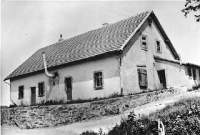
The first executions of Jews takes place at the Natzweiler concentration camp in Alsace: (THP)
It was one of the smaller concentration camps built by the Germans. Until construction was completed in May 1941, prisoners slept in the nearby former Hotel Stutthof, hence the name Natzweiler-Stutthof. The camp held about 1,500 prisoners. Prisoners worked in nearby granite quarries, in construction projects, and in the maintenance of the camp.
Excerpts from a memorandum of an agreement between Reichsfuehrer SS Himmler, and the Minister of Justice[sic], Thierack:
2. Transfer of asocial elements from prison to the Reichsfuehrer SS for extermination through work. To be transferred without exception are persons under protective arrest, Jews, Gypsies, Russians and Ukrainians, Poles with more than 3-year sentences, Czechs, and Germans with more than 8-year sentences, according to the decision of the Reich Minister for Justice. First of all the worst asocial elements amongst those just mentioned are to be handed over. I shall inform the Fuehrer of this through Reichsleiter Bormann.
14. It is agreed that, in consideration of the intended aims of the Government for the clearing up of the Eastern problems, in the future, Jews, Poles, Gypsies, Russians, and 'Ukrainians are no longer to be tried by the ordinary courts, so far as punishable offenses are concerned; but are to be dealt with by the Reichsfuehrer SS. This does not apply to civil lawsuits, nor to Poles whose names are reported or entered in the German racial lists.
A decree orders that German Jews are no longer entitled to buy meat, eggs, and milk products. (THP)
1944 World War II: Various:
The Warsaw Uprising: 107 American B-17's drop 1,284 containers to Warsaw, of which nearly a thousand fall into German hands.
War in the Pacific: British submarine HMS Tradewind torpedoes the Junyo Maru. The Junyo Maru was packed with 1,377 Dutch, 64 British and Australian prisoners of war along with 4,200 Javanese slave laborers bound for work on the railway line being built between Pakan Baru and Muaro in Sumatra. It was the world's greatest sea disaster at the time with 5,620 dead. 723 survivors were rescued only to be put to work in conditions similar to those of the Burma railway where death was commonplace.
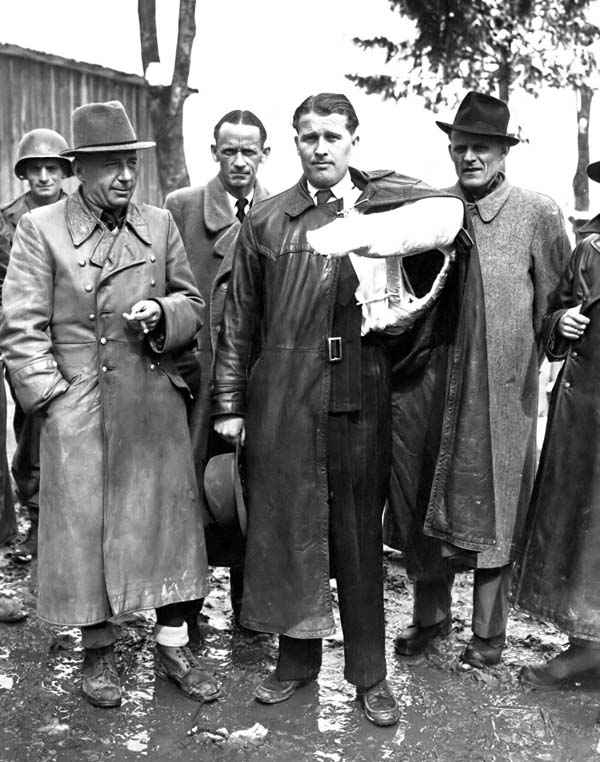
1945 Various:
Wernher von Braun, (suffering from hepatitis that he probably contracted through treatment for his broken arm), and six other German rocket experts arrive under guard at Newcastle Army Air Base in Wilmington, Delaware. They are loaded aboard a DC-3, and transferred to Boston's Logan Field. From there they are taken to Fort Strong, Long Island, for processing and interrogation. (Piszkiewicz)
From Vanguard: A History by Constance McLaughlin Green and Milton Lomask:
The haughtiness of the Germans who landed at Wright Field in the autumn of 1945 was not endearing to the Americans who had to work with them. The Navy wanted none of them, whatever their skills. During a searching interrogation before the group left Germany, a former German general had remarked testily that, had Hitler not been so pig-headed, the Nazi team might now be giving orders to American engineers . . . . The American scientist conducting the questioning growled in reply that Americans would never have permitted a Hitler to rise to power.
[See: Wunderwaffen: Hitler's Deception and the History of Rocketry.]MacArthur in Tokyo:
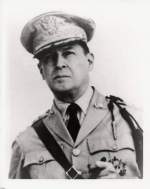
On this day in 1945, Gen. Douglas MacArthur moves his command headquarters to Tokyo, as he prepares for his new role as architect of a democratic and capitalist postwar Japan.
Japan had had a long history of its foreign policy being dominated by the military, as evidenced by Prime Minister Fumimaro Konoye's failed attempts to reform his government and being virtually pushed out of power by career army officer Hideki Tojo. MacArthur was given the task of overseeing the regeneration of a Japan shorn of its imperial past. As humiliating as it would be for the defeated Japanese, the supreme allied commander in the South Pacific would lay the groundwork for Japan's rebirth as an economic global superpower.
The career of Douglas MacArthur is composed of one striking achievement after another. When he graduated from West Point, only one other person, Robert E. Lee, had exceeded MacArthur's performance, in terms of awards and average, in the institution's history. His performance in World War I, during combat in France, won him decorations for valor and resulted in his becoming the youngest general in the Army at the time. He retired from the Army in 1934, only to be appointed head of the Philippine Army by its president (the Philippines had U.S. Commonwealth status at the time).
When World War II broke out, MacArthur was called back to active service-as commanding general of the U.S. Army in the Far East. Because of MacArthur's time in the Far East, and the awesome respect he commanded in the Philippines, his judgment had become somewhat distorted and his vision of U.S. military strategy as a whole myopic. He was convinced that he could defeat Japan if it invaded the Philippines. In the long term, he was correct. But in the short term, the United States suffered disastrous defeats at Bataan and Corregidor. By the time U.S. forces were forced to surrender, he had already shipped out, on orders from President Roosevelt. As he left, he uttered his immortal line, "I shall return."
Refusing to admit defeat, MacArthur was awarded supreme command in the Southwest Pacific, capturing New Guinea from the Japanese with an innovative "leap frog" strategy. True to his word, he returned to the Philippines in October 1944. With the help of the U.S. Navy, which succeeded in destroying the Japanese fleet, leaving the Japanese garrisons on the islands without reinforcements, the Army defeated adamantine Japanese resistance. On March 3, 1945, MacArthur handed control of the Philippine capital back to its president.
On September 2, 1945, MacArthur signed the instrument of surrender on behalf of the victorious Allies, aboard the USS Missouri, docked in Tokyo Bay. But the man who oversaw Japan's defeat was about to put it on the road to its own kind of victory. (History.com)
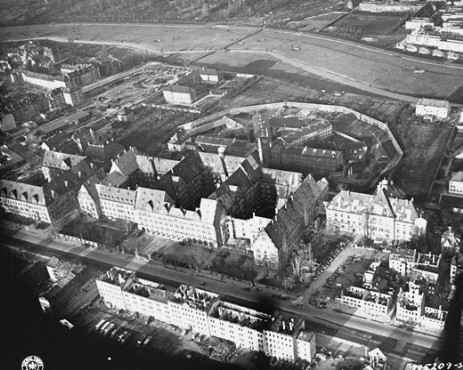
1946 Nuremberg Tribunal: The justices continue meeting to discuss verdicts in the Major War Criminals Trial. (See: 30 September 1946)
1947 USA: Various:
The National Security Act, unifying the Army, Navy and newly formed Air Force into a national military establishment, goes into effect. [For further information, click here.]
From a report for inclusion in von Braun's dossier, from the Military Governor: Office of Military Government for the US (OMGUS):
Based on available records, subject [von Braun] is not a war criminal. He was an SS officer but no information is available to indicate that he was an ardent Nazi. Subject is regarded as a potential security threat by the Military Governor, Office of Military Government for the US. A complete background investigation could not be obtained because subject was evacuated from the Russian zone of Germany.

Rabbi Stephan Wise pens a letter to the US Secretary of State, protesting the "ardent pro-Nazis" of Operation Paperclip being in the US while visas to concentration camp survivors are being delayed:
Red tape, lack of shipping facilities, and every possible handicap face these oppressed people, while their oppressors are brought to this country and are favorably housed and supported at our expense. As long as we reward former servants of Hitler while leaving his victims in D.P. (Displaced Persons) camps, we cannot pretend that we are making real effort to achieve the aims we fought for.
1960 Castro arrives in New York:
Fidel Castro arrives in New York City as the head of the Cuban delegation to the United Nations. Castro's visit stirred indignation and admiration from various sectors of American society, and was climaxed by his speech to the United Nations on September 26. [For further details, Click here.]
2003 Death: Emil Fackenheim: German Holocaust survivor and philosopher. Born in Halle, Germany, he was arrested by the Nazis on the night of November 9, 1938, known as Kristallnacht. Briefly interned at the Sachsenhausen concentration camp (1938-1939), he escaped to Great Britain where his parents later joined him. Emil's older brother, who refused to leave Germany, was killed in the Holocaust . . . . "He was always saying that continuing Jewish life and denying Hitler a posthumous victory was the 614th law", referring to the 613 Mitzvot given to the Jews in the Torah.
Edited by Levi Bookin (Copy editor)
levi.bookin@gmail.com
Disclaimer: This site includes diverse and controversial materials—such as excerpts from the writings of racists and anti-Semites—so that its readers can learn the nature and extent of hate and anti-Semitic discourse. It is our sincere belief that only the informed citizen can prevail over the ignorance of Racialist "thought." Far from approving these writings, this site condemns racism in all of its forms and manifestations.
Fair Use Notice: This site may contain copyrighted material the use of which has not always been specifically authorized by the copyright owner. We are making such material available in our efforts to advance understanding of historical, political, human rights, economic, democracy, scientific, environmental, and social justice issues, etc. We believe this constitutes a "fair use" of any such copyrighted material as provided for in section 107 of the US Copyright Law. In accordance with Title 17 U.S.C. Section 107, the material on this site is distributed without profit to those who have expressed a prior interest in receiving the included information for research and educational purposes. If you wish to use copyrighted material from this site for purposes of your own that go beyond 'fair use', you must obtain permission from the copyright owner.
Please Note: The list-owner and moderators of 3rdReichStudies are not responsible for, and do not necessarily approve of, the random ads placed on our pages by our web server. They are, unfortunately, the price one pays for a 'free' website.